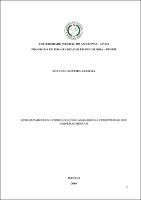| ???jsp.display-item.social.title??? |


|
Please use this identifier to cite or link to this item:
https://tede.ufam.edu.br/handle/tede/7746Full metadata record
| DC Field | Value | Language |
|---|---|---|
| dc.creator | Barbosa, Edvania Oliveira | - |
| dc.creator.Lattes | http://lattes.cnpq.br/6744152825835875 | por |
| dc.contributor.advisor1 | Hayasida, Nazare Maria de Albuquerque | - |
| dc.contributor.advisor1Lattes | http://lattes.cnpq.br/3015930558513406 | por |
| dc.contributor.referee1 | Resende, Gisele Cristina | - |
| dc.contributor.referee1Lattes | http://lattes.cnpq.br/0524959272545250 | por |
| dc.contributor.referee2 | Szupszynski, Karen Priscila Del Rio | - |
| dc.contributor.referee2Lattes | http://lattes.cnpq.br/9339497321429214 | por |
| dc.date.issued | 2019-12-16 | - |
| dc.identifier.citation | BARBOSA, Edvania Oliveira. Estilos parentais e configurações familiares na constituição dos esquemas mentais. 2019. 134 f. Dissertação (Mestrado em Psicologia) - Universidade Federal do Amazonas, Manaus, 2019. | por |
| dc.identifier.uri | https://tede.ufam.edu.br/handle/tede/7746 | - |
| dc.description.resumo | Este estudo visa refletir sobre as configurações familiares na contemporaneidade, compreendendo a influência destas no desenvolvimento dos membros da família, utilizando-se dos pressupostos da Terapia do Esquema (TE), que descrevem a importante contribuição dos papeis parentais na formação de Esquemas Iniciais Desadaptativos (EIDs). Trata-se de metodologia quantitativo-descritiva, exploratória, transversal, caracterizada por um estudo clínico, com objetivo de compreender as configurações familiares e estilos parentais na influência do desenvolvimento de EIDs. A amostra foi composta por 129 pessoas (n=129), entre 18 e 34 anos, sendo utilizados o Questionário sócio demográfico, Questionário de esquemas e Inventário de estilos parentais. No que se refere a configuração familiar, observou-se do tipo Nuclear 53,5% (n=69), Monoparental e Ampliada foi de 18,6% (n=24) para cada uma e a Recasada, foi de 9,3% (n=12). Quanto a classificação dos esquemas comparada a configuração familiar, não houve associações estatisticamente significativas. Enquanto que, referente aos Estilos parentais, observou-se que estes influenciam na formação de EIDs. Observou-se que o EIDs mais ativado foi Fracasso, que contribui para as relações parentais na manutenção deste esquema, o que expresa a influência dos estilos parentais no processo de autonomia e desempenho acadêmico dos filhos.Concluiu-se que há maior significância dos Estilos parentais do que das Configurações familiares na constituição de EIDs e, por fim, destacamos que a família está em transformação constante e não constitui potencial de adoencimento, desde que haja comunicação e interções saudáveis entre seus membros. Espera-se que os elementos encontrados neste estudo auxiliem outras pesquisas na área, a fim de aprofundar conhecimentos para promover saúde e melhores estratégias de prevenção em crianças e jovens. | por |
| dc.description.abstract | This study aims to reflect upon contemporary family arrangements, comprehending the influence of these in the development of family members, using the Schema Therapy (ST) concepts, which describe the important contribution of the parental roles in the development of the Early maladaptive schemas (EMS). It’s based on quantitative descriptive, cross-sectional exploratory study of knowledge, characterized by a clinical trial, which focus on understanding the family arrangements and the parenting styles influencing the development of EMS. The research was undergone with a sample of 129 people, aged 18 - 34, using social demographic questionnaire, schema questionnaire and parenting styles inventory. On family arrangements, Nuclear 53,5%, Single parent 18,6 %, Extended 18,6% and Remarried 9,3% were observed. When compared the maladaptive schemas to the family arrangements, no results were found that could point towards meaningful statistics correlations. However, it was observed that parenting styles impact on the development of EMS. Failure was the most active EMS, asserting the contribution of parental relations in the upkeep of the schema, expressing the influence of the parenting styles on the process of autonomy and academic development of their children. It was concluded that appears to exist more correlation between parenting styles than family arrangements on the development of EMS, emphasizing the fact that families are in an everchanging process, not comprising an illness possibility, provided there is communication and healthy interaction among its members. It is expected that these findings provide help in other researches in this field, in order to deepen the information to promote health better prevention practices in children and young people. | por |
| dc.description.sponsorship | FAPEAM - Fundação de Amparo a Pesquisa no Estado do Amazonas | por |
| dc.format | image/jpeg | * |
| dc.format | application/pdf | * |
| dc.thumbnail.url | https://tede.ufam.edu.br//retrieve/38251/Disserta%c3%a7%c3%a3o_EdvaniaBarbosa_PPGPSI.pdf.jpg | * |
| dc.language | por | por |
| dc.publisher | Universidade Federal do Amazonas | por |
| dc.publisher.department | Faculdade de Psicologia | por |
| dc.publisher.country | Brasil | por |
| dc.publisher.initials | UFAM | por |
| dc.publisher.program | Programa de Pós-graduação em Psicologia | por |
| dc.rights | Acesso Aberto | por |
| dc.subject | Terapia do Esquema | por |
| dc.subject | Esquemas Iniciais Desadaptativos | por |
| dc.subject | Estilos parentais | por |
| dc.subject | Configurações familiares | por |
| dc.subject | Inibição emocional | por |
| dc.subject.cnpq | CIÊNCIAS HUMANAS | por |
| dc.title | Estilos parentais e configurações familiares na constituição dos esquemas mentais | por |
| dc.type | Dissertação | por |
| dc.subject.user | Terapia do Esquema | por |
| dc.subject.user | Esquemas Iniciais Desadaptativos | por |
| dc.subject.user | Configurações familiares | por |
| Appears in Collections: | Mestrado em Psicologia | |
Files in This Item:
| File | Description | Size | Format | |
|---|---|---|---|---|
| Dissertação_EdvaniaBarbosa_PPGPSI.pdf | Dissertação_EdvaniaBarbosa_PPGPSI | 2.35 MB | Adobe PDF |  Download/Open Preview |
Items in DSpace are protected by copyright, with all rights reserved, unless otherwise indicated.




